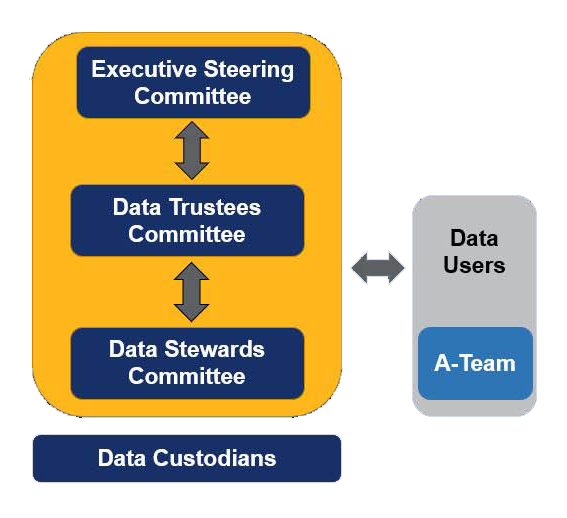Committees
Our Framework
UNCG has developed a multi-level framework in which major data related roles and responsibilities are organized into several decision-making bodies. The three main bodies of Data Governance here at UNCG are the Executive Steering Committee (ESC), the Data Trustees Committee, and the Data Stewards Committee. To learn more about the ESC, check out Executive Steering Committee (uncg.edu). These committees are supported by two groups of Data Custodians and interact with the Academic Unit Liaisons sub-committee and campus Data Users.

Committees
In the role of Data Sponsor, the Executive Steering Committee oversees both Data Governance and IT Governance at UNCG. They provide executive level sponsorship for the Data Governance committees. To learn more about the ESC, check out Executive Steering Committee (uncg.edu).
The Data Trustees Committee is the main strategic level of UNCG’s Data Governance framework. This committee is made up of senior level administrative officials from across the university who are responsible for the development and oversight of Data Governance strategy, policies, standards, and processes. The members of this committee promote resource management among their units and across the UNCG community. They identify and define strategic key performance indicators to highlight achievement of Data Governance initiatives. Data Trustees approve data access requests and work with ITS partners to classify data and to identify storage and handling requirements based on classification levels. To learn more about our charter and membership, go to Data Governance Committees (uncg.edu).
The Data Stewards committee is comprised of operational level administrators from across campus. The members of this committee are those individuals whose daily responsibilities include direct hands-on work with institutional data. They are responsible for ensuring that our data is appropriately defined, that it is accurate, that Data Users understand the data and its purpose, and that training resources are developed for new staff in the use and understanding of institutional data. To learn more about our charter and membership, go to Data Governance Committees (uncg.edu).
Roles & Responsibilities
The Data Sponsor provides executive-level sponsorship and support of University of North Carolina at Greensboro (UNCG) data governance activities. The Executive Steering Committee (ESC) serves as the current Data Sponsor for UNCG data governance. The Data Sponsor (i.e., the ESC) is trained, qualified, and responsible for supporting and sponsoring data governance initiatives. See Committees for more information.
A Data Trustee (or Business Steward) is a senior University official (or their designee) who has planning and policy-level responsibilities for data within their functional areas and management responsibilities for defined segments of institutional data. Data Trustees are responsible for assigning Data Stewards, participating in establishing policies
and standards, and promoting data resource management for the good of the University. A Data Trustee plans and sets data policy and responds to data access and policy or standards implementation issues.
A Data Steward is a University official with direct operational-level responsibility for information management. Data Stewards (Operational Data Stewards, Technical Stewards, or Data and Information Stewards) are responsible for operational-level metadata management and ensuring data quality. Data Stewards help build data literacy and have direct hands-on data responsibilities.
Data Custodians are individuals responsible for managing and governing the technical environment where data resides. They ensure safe custody, transport, and storage of the data, and are responsible for the implementation of business rules. Data Custodians at UNCG consist of Technology Custodians and Governance Custodians.
Technology Custodians include the members of Information Technology Services and other distributed campus technology personnel. They provide a secure infrastructure in support of the data.
The Enterprise Data Governance Team serves as Governance Custodians, responsible for execution and enforcement of policies and processes regarding definition, production, and usage of data.
Data Users are individuals who need and use University data as part of their assigned duties or in fulfillment of assigned roles or functions within the University community. Individuals who are given access to sensitive data have a position of special trust and as such, are responsible for protecting the security and integrity of the data. There is an expectation of accountability in working with institutional data.